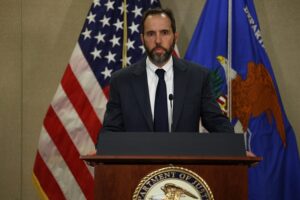
(Photo by Tom Brenner for The Washington Post via Getty Images)
Special Counsel Jack Smith is once again politely tapping the horn in the direction of the Supreme Court, urging the justices to hurry up and rule on Trump’s immunity motion so he can be held accountable for interfering in the last election before running in the next one.
“Consistent with the Court’s expedited treatment of this case, the government respectfully requests that the Court issue the opinion and a certified copy of the judgment forthwith,” the special counsel wrote at the end of the government’s brief.

Why Better Billing Statements Can Improve Your Firm’s Finances—And Your Client Relationships
Outdated billing is costing law firms money. Discover how clear, modern billing practices boost profits, trust, and cash flow in 2025.
Indeed, Smith has been trying to get the Court to rule on Trump’s preposterous immunity claims since December, when he requested certiorari before judgment and expedited review. The justices refused, leaving the DC Circuit to bat around Trump’s counsel D. John Sauer like a chew toy at oral arguments. In the first few minutes, Judge Florence Pan forced the attorney to admit that, yes, he actually was suggesting that a sitting president could order SEAL Team 6 to assassinate a political rival and escape prosecution if he was not impeached for it and convicted in the Senate.
The appellate opinion was both comprehensive and withering, and yet SCOTUS still felt the need to weigh in on the novel issue of “when the president does it, that means that it is not illegal.”
On February 28, it granted cert with respect to the issue of “Whether and if so to what extent does a former President enjoy presidential immunity from criminal prosecution for conduct alleged to involve official acts during his tenure in office.” With argument set for April 25, it seems all but certain that the case will not go to trial before November. But that didn’t stop the prosecution from coming out swinging.
“[T]his prosecution is a historical first not because of any assumption about immunity but instead because of the singular gravity of the alleged conduct,” he wrote in response to Trump’s claim that, because that no prior president has ever been criminally indicted, we must infer permanent immunity for ex-office holders.

Why Some Firms Are Leading The Market With Generative AI
A culture of innovation with strategic AI like Lexis+ AI is revolutionizing law firms by boosting efficiency and deepening client relationships.
“The severity, range, and democracy-damaging nature of the alleged crimes are unique in American history,” he continued, noting inter alia that: (1) Ford pardoned Nixon, and Nixon accepted, because they both agreed that he faced criminal jeopardy; (2) the Impeachment Judgment Clause specifically contemplates the prosecution of ex-presidents; (3) the Office of Legal Counsel has repeatedly concluded that ex-presidents do not enjoy immunity for criminal prosecution; and (4) the logical conclusion of Trump’s reasoning would be to allow presidents to get away with “bribery, murder, treason, and sedition.”
“The President’s constitutional duty to take care that the laws be faithfully executed does not entail a general right to violate them,” the prosecutor fumed, adding that Trump “asserts a new presidential power to be free of congressional commands in criminal statutes in virtually all circumstances.”
Trump has argued that an ex-president’s immunity from civil suits based on his official acts translates into an analogous criminal immunity, without which a president would feel constrained in the performance of his official duties. But civil suits can be lodged by any rando willing to pony up the $402 filing fee, while criminal prosecutions are government acts:
Institutional standards of impartial prosecution are embedded in longstanding DOJ norms set forth in Department policy. The grand jury provides a further independent check against abusive prosecutions, and a trial unfolds in public within the systemic constraints of the adversary criminal justice system. Finally, Article III courts—including this Court—ensure that any prosecution of a former President stays within constitutional limits.
Perhaps mindful that the justices might be loathe to declare a blanket ban on immunity, Smith is also hedging his bets. In the event that the Court would prefer to issue a ruling good for one ticket only, the prosecutor suggests that it might issue a narrow holding that “the specific form of criminal conduct charged here—efforts to subvert an election in violation of the term-of-office clause of Article II and the constitutional process for electing the President—does not justify any form of immunity.” And even if the court were inclined to find some kind of perpetual presidential immunity, “the private conduct that the indictment alleges is sufficient to support the charges. Thus, even if liability could not be premised on official acts, the case should be remanded for trial, with the district court to make evidentiary and instructional rulings in accordance with this Court’s decision.”
Of course, all this is moot if Trump gets back in power and shuts down the cases against him. But, no hurry, guys!
Trump v. US [SCOTUS Docket]
Liz Dye lives in Baltimore where she produces the Law and Chaos substack and podcast.